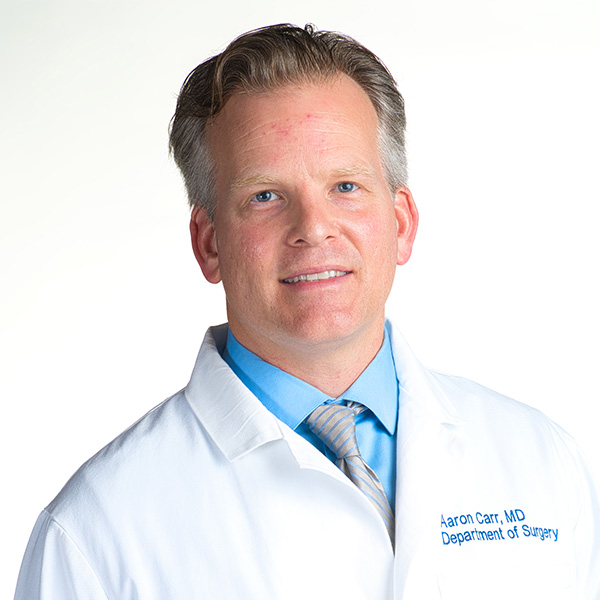What is Colorectal Cancer and Why Does it Matter?
February 27, 2022
By: Aaron Carr, MD
Categories: Healthy Living
Colorectal cancer is a common cause of cancer death.
March is colorectal cancer awareness month. Why does colorectal cancer (CRC) have its own month for awareness? It is the third most common form of cancer and one person every 10 minutes dies of colon and rectal cancer. But it is preventable.
What is colorectal cancer?
This type of cancer occurs in your belly, also known as your abdomen. When you swallow food, it travels down your esophagus to your stomach to begin digestion. The food then enters your small intestine, which is over 20 feet in length, and is where most of the nutrients from food are absorbed. Finally, the food enters the colon (5-10 feet in length), which is where water is reabsorbed, stool is formed and is propelled to where it exits at the rectum. Colorectal cancer is a cancer that occurs in the colon and rectum in the last 5-10 feet of your intestine.
How does this cancer occur?
The most common form of colorectal cancer is called adenocarcinoma. Colon cancer generally begins as a small abnormal growth along the surface of the inside of your colon or rectum called a polyp. Polyps are abnormal benign growths of tissue in the colon and rectum. "Benign" means they are, in and of themselves, harmless. However, certain types of polyps like adenomas increase an individual’s risk for cancer. Adenomas occur in 25-30% of people at age 50. If polyps are identified they can be removed during colonoscopy, and cancer can be prevented.
Why should I care about colorectal cancer?
One person every 10 minutes dies of colorectal cancer in the United States, which is about 52,000 people per year. About 140,000 people will be diagnosed this year with this type of cancer. It is the third most common cause of cancer death in women and second most common cause of cancer death of men in the United States.
But death is not the only negative outcome of colorectal cancer. If not caught and treated early, patients who survive often experience significant impacts on their quality of life and their ability to do the things they love to do. Early detection and treatment can mitigate these impacts and improve outcomes for patients.
What are the symptoms of colorectal cancer?
Unfortunately, colon cancer does not always cause symptoms until it has grown to a larger size. Therefore, screening tests like colonoscopy are the best way to detect cancer when it is smaller and easier to treat. Common symptoms include the following:
- Change in bowel habits, like constipation, diarrhea, or change in caliber of stool
- Rectal bleeding or blood in your stool
- Anemia or low blood counts on routine blood work
- Unexplained weight loss
- Weakness or fatigue
- Persistent abdominal cramps or pain
What factors increase my risk for colorectal cancer?
Anyone over age 50 is at increased risk. Also, men have a slightly increased rate compared to women, and according to The American Cancer Society, 1 in 23 men compared to 1 in 25 women will develop this type of cancer during their lifetime. Also, African Americans have an increased rate, accounting to the Centers for Disease Control and Prevention.
Other risk factors include personal history of colon polyps, family history of colon cancer, obesity, smoking, type 2 diabetes, sedentary lifestyle, consuming processed meats, and excess alcohol intake.
What can I do to help prevent colorectal cancer?
Key recommendations include:
- Engage in physical activity (like daily walking for at least 30 minutes)
- Eat a whole food, healthy diet high in vegetables, certain fruits, and fiber
- Consider decreasing red and processed meat
- Schedule a routine screening test for colorectal cancer starting at age 45 years old for average risk individuals, and younger for high-risk individuals
What is my next step?
If you have symptoms that might indicate colorectal cancer, talk to your Primary Care Provider (PCP) as soon as possible. He or she can assess your symptoms and then refer you to a gastroenterologist or general surgeon, as appropriate. If you don't have a PCP, you can use our Find a Doctor website feature or call us at (706) 389-3892 to find one.
If you do not have symptoms and are 45-50 years of age, talk to your PCP at your next wellness visit about when you should have your first screening exam. Again, if you need to find a PCP, visit our "Find a Doctor" feature or give us a call.
The general surgeons at Athens General and Colorectal Surgery, part of St. Mary's Medical Group, are highly skilled and experienced in performing colonoscopies and surgeries to treat colorectal cancer.

About Aaron Carr, M.D.
Dr. Carr specializes in general, foregut and bariatric surgery. At UC Davis in Sacramento, he has practiced within the Division of Foregut and Endometabolic Surgery and has been a Co-instructor of Record for Surgical Education in the School of Medicine.
He earned his bachelor’s degree in physics, Magna Cum Laude, from the University of Alabama in Birmingham, where he was also a NASA Space Center Grant Scholar. He went on to receive his medical degree from the University of South Alabama College of Medicine in Mobile, and to complete his residency in categorical general surgery at Atlanta Medical Center, where he served as chief resident in 2012.
He is certified by the American Board of Surgery and holds specialty certifications in fundamentals of laparoscopic and endoscopic surgery. He is a member of the Society of American Gastrointestinal and Endoscopic Surgeons, the American Society for Metabolic and Bariatric Surgery, and the American College of Surgeons.
Dr. Carr has been active in a wide variety of research projects on topics such as diabetes in bariatric surgery patients, single-incision and multi-incision robotic gallbladder removal surgery and alleviating chronic pain in thoracic surgery patients. His current research interests include comorbidities and outcomes in bariatric surgery and robotic and endoscopic surgical innovation.



